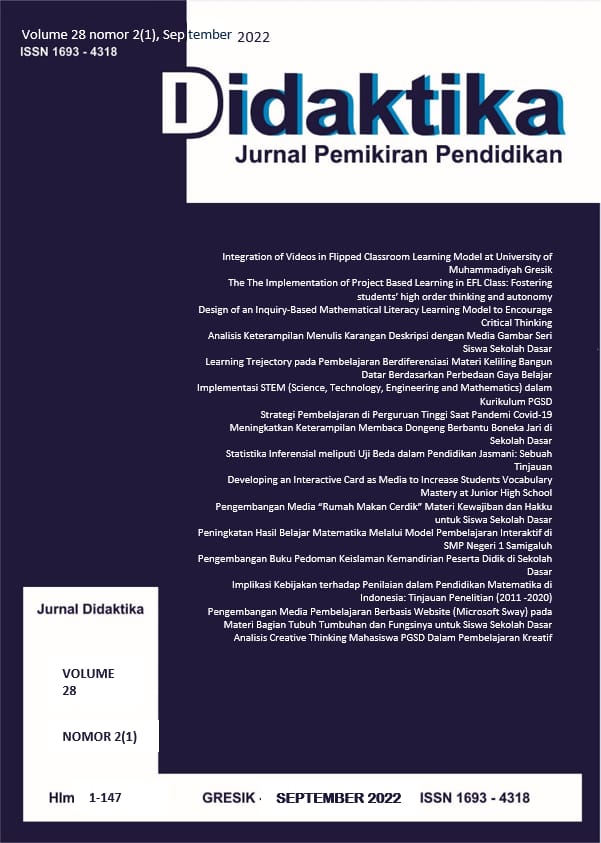Implikasi Kebijakan terhadap Penilaian dalam Pendidikan Matematika di Indonesia: Tinjauan Penelitian (2011 -2020)
DOI:
https://doi.org/10.30587/didaktika.v28i2.3912Keywords:
Penilaian, Pendidikan Matematika, Kebijakan PendidikanAbstract
Artikel ini mengulas berbagai penelitian yang signifikan dan beragam tentang penilaian dalam pendidikan matematika di Indonesia sebagai hasil dari perubahan kebijakan pendidikan di Indonesia. Hasil penelitian yang menjadi bahan kajian adalah periode sepuluh tahun terkahir 2011–2020. Dalam konteks pendidikan, penilaian dapat dirancang untuk menargetkan peserta didik, calon guru, atau guru, baik sebagai individu atau sebagai perwakilan kelompok, dan untuk berbagai tujuan. Salah satu tujuan utama penilaian dalam pendidikan matematika adalah untuk memberikan bukti yang dapat digunakan untuk membuat keputusan tentang pendidikan matematika, yang kemudian menimbulkan pertanyaan tentang aspek kompetensi matematika mana yang harus dinilai, serta bagaimana dan untuk tujuan apa. Artikel tinjauan ini membahas dua tema terkait: (1) masalah yang terkait dengan proses penilaian dan pengembangan penilaian yang dapat menilai kompetensi matematika secara valid; (2) isu terkait kebijakan pendidikan dan hubungan antara penilaian dan kebijakan. Hubungan antara penilaian dengan pembelajaran yang merupakan produk perubahan kebijakan ditunjukkan di artikel ini
Downloads
Published
How to Cite
Issue
Section
License
License and Copyright Agreement
In submitting the manuscript to the journal, the authors certify that:
- They are authorized by their co-authors to enter into these arrangements.
- The work described has not been formally published before, except in the form of an abstract or as part of a published lecture, review, thesis, or overlay journal.
- That it is not under consideration for publication elsewhere,
- That its publication has been approved by all the author(s) and by the responsible authorities – tacitly or explicitly – of the institutes where the work has been carried out.
- They secure the right to reproduce any material that has already been published or copyrighted elsewhere.
- They agree to the following license and copyright agreement.
Copyright
Authors who publish with DIDAKTIKA: Jurnal Pemikiran Pendidikan agree to the following terms:
- Authors retain copyright and grant the journal right of first publication with the work simultaneously licensed under a Creative Commons Attribution License (CC BY-SA 4.0) that allows others to share the work with an acknowledgment of the work's authorship and initial publication in this journal.
- Authors are able to enter into separate, additional contractual arrangements for the non-exclusive distribution of the journal's published version of the work (e.g., post it to an institutional repository or publish it in a book), with an acknowledgment of its initial publication in this journal.
- Authors are permitted and encouraged to post their work online (e.g., in institutional repositories or on their website) prior to and during the submission process, as it can lead to productive exchanges, as well as earlier and greater citation of published work.
Licensing for Data Publication
Open Data and Software Publishing and Sharing
The journal strives to maximize the replicability of the research published in it. Authors are thus required to share all data, code or protocols underlying the research reported in their articles. Exceptions are permitted but have to be justified in a written public statement accompanying the article.
Datasets and software should be deposited and permanently archived inappropriate, trusted, general, or domain-specific repositories (please consult http://service.re3data.org and/or software repositories such as GitHub, GitLab, Bioinformatics.org, or equivalent). The associated persistent identifiers (e.g. DOI, or others) of the dataset(s) must be included in the data or software resources section of the article. Reference(s) to datasets and software should also be included in the reference list of the article with DOIs (where available). Where no domain-specific data repository exists, authors should deposit their datasets in a general repository such as ZENODO, Dryad, Dataverse, or others.
Small data may also be published as data files or packages supplementary to a research article, however, the authors should prefer in all cases a deposition in data repositories.











